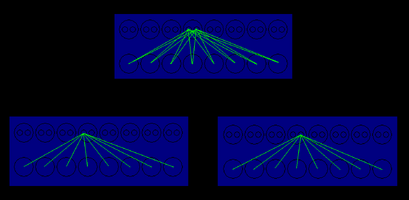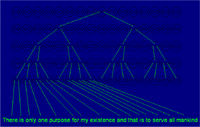Throughout my life Artificial Intelligence has always grabbed my imagination. I have tried to conceptualize how it would be possible but because of my lack of programing skills my efforts have been fruitless. I hope that someone will be able to use my ideas to do what I can not.
The concept[]
Nodes remember 2 patterns. The 1st pattern a node remembers is the one that activated it. The 2nd pattern a node remembers is one that came after the 1st pattern and is different form the 1st pattern.

As information perpetrates up the layers of the neural network nodes in the top layers are activated less often. The length of patterns recognized increases with each layer. Shorter sequences often repeat in longer sequences.

This type of neural network I have thought up I believe could be able to recognize any type of sequence, be it visual or audio.
Comments[]
Gjeremy,
I, too, have a longstanding interest in A.I. Have I understood correctly that what your network achieves or aims to achieve, is to recognise and create patterns which have 'structure', for example music is not random notes, but involves repetition with variation? Walking is not a random sequence of muscle impulses, but involves repeated sequences, repeated with variation, and the repeats are at various time scales?
I think you'll be the first to agree that there is something missing or still needed from the network that you've shown in order to make an AI that can compose music or that can walk, something missing more fundamental than legs or a musical instrument, which can relatively easily be provided. Many A.I. researchers hope that 'adding more nodes' and a 'larger training set' will solve the problem. But in my view that's wishful thinking. Squids have only a few neurons but are capable of complex tasks. There is something deeper.
Now, I don't know what that something is, but I do know some of the places to look. You need to generate interesting questions that help you to understand the mechanics of thought. Smaller questions may help understanding and show what's missing from the network:
- Given that eidetic memory does exist, "Why don't we all have eidetic memory"?
- Why are our brains all in one place, and not distributed throughout the body?
- Can DNA store memories, and if so, how much information can one cell hold?
If you have questions like these, ask them. We can move the discussion to a discussion page. Both our understanding should improve.JC 13:28, 13 February 2007 (UTC)
